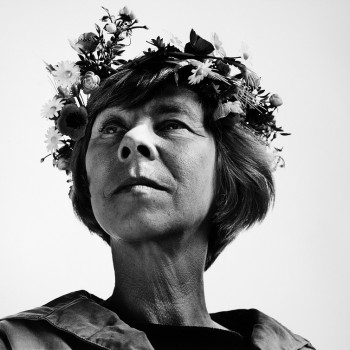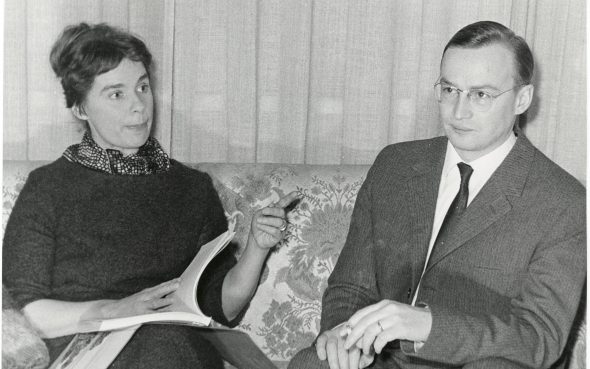Search results for "Что такое архетипы коллективного бессознательного больше в insta---batmanapollo"
Instant erudition, or, who are you kidding?
2 September 2014 | Articles, Letter from the Editors, Non-fiction
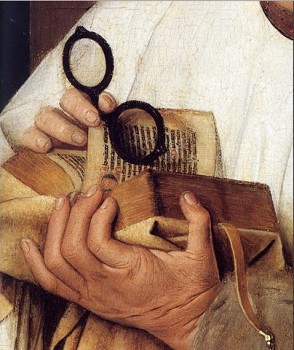
Time to read? Detail from Madonna with Canon van der Paele by Jan van Eyck (1439. The Groeninge Museum, Brugge). Wikipedia
In a recent ‘Saturday essay’ in the Helsingin Sanomat newspaper (9 August) journalist Oskari Onninen ponders the moral dilemma of pretending to be erudite. For example, who has the time to read books these days? ‘The Woolfs remain unread, Bergmans unwatched’, Onninen writes.
Our consumerist lifestyle forces us to follow the trends of ever-expanding, multiplying forms of entertainment. However, it is apparent that the need to know about culture in order to pass as a cultured, well-informed citizen still exists, to some extent at least.
According to Onninen, there is less and less time for unproductivity. ‘If one looks for measurable cost-benefit results from the reading of heavyweight fiction, the act of reading will certainly not always be worthwhile.’ Consuming art (reading books, going to art exhibitions, watching plays) requires time and effort, and how productive is that? More…
The snake
31 March 1998 | Fiction, Prose
In this horror story by the Finland-Swedish author Kjell Lindblad (born 1951), a man believes he is wandering among art installations in an apartment block – but the reality he is experiencing turns out to be much more sinister. From the collection of short stories Oktober-mars (‘October-March’, Schildts, 1997)
I only noticed the poster on the notice board in the vegetarian restaurant because it was so obviously different from the rest of the colourful items there, with their large headlines offering everything from Atlantic meditation to Zen ping-pong, together with promises of a new and fulfilled life in harmony with the soul and the cosmos. Poster is perhaps an overstatement it was a white sheet of paper with an egg-shaped oval in the middle. Inside the oval there was a horizontal row of seven numbers. For some reason, perhaps because the row of numbers was the only information on the piece of paper, it stuck in my memory and when I got home I had a compulsive desire to find out if it was a phone number. So I dialled the number and a tape-recorded voice that could have belonged to a man but equally well to a woman, said:
‘We bid you welcome. Please don’t write down the address just memorise it….’ More…
Out of this world
31 December 1996 | Archives online, Fiction, Prose
Extracts from the novel Virkamatka (‘Business travel’, Otava, 1996). Introduction by Jyrki Kiiskinen
I spent a couple of weeks alone at home that summer. My brother was at camp and my father on a business trip. Bored one rainy day, I opened up their last game on the computer. They had been going on about it for weeks.
I began from the beginning, A splendid start: texts backed by imaginative visions, Then darkness. In the middle of it a gold-coloured, glimmering dot. Nothing else. I waited for a long time. Nothing else, I waited. Nothing. Then I pressed the computer’s space-bar. The dot exploded and the explosion filled the entire screen. From its centre swarmed familiar patterns, Diagrams of atomic nuclei, electrons, radiation. More…
In the detail?
11 December 2009 | Essays, Non-fiction
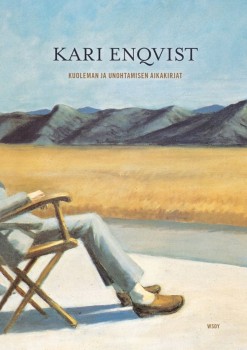 Extracts from Kuoleman ja unohtamisen aikakirjat (‘Chronicles of death and oblivion’, WSOY, 2009)
Extracts from Kuoleman ja unohtamisen aikakirjat (‘Chronicles of death and oblivion’, WSOY, 2009)
What’s the meaning of life? There are those who seek it in religion, while for others that is the last place to look. The scientist Kari Enqvist ponders why some people, including himself, seem physiologically immune to the lure of faith. Perhaps, he suggests, we should look for significance not in the big picture, but in the marvel of the fleeting moment
As a young boy I must have held religious beliefs. However, I cannot pinpoint exactly when they disappeared. At some point I eventually stopped saying my evening prayers, but I am unable to remember why or when this happened. ‘I was born in a time when the majority of young people had lost faith in God, for the same reason their elders had had it – without knowing why,’ writes the Portuguese poet Fernando Pessoa in The Book of Disquiet. More…
When I’m ninety-four
14 November 2013 | Fiction, Prose
An extract from the novel Kuolema Ehtoolehdossa (‘Death in Twilight Grove’, Teos, 2013). Minna Lindgren interviewed by Anna-Leena Ekroos
At the Health Clinic, Siiri Kettunen once more found a new ‘personal physician’ waiting for her. The doctor was so young that Siiri had to ask whether a little girl like her could be a real doctor at all, but that was a mistake. By the time she remembered that there had been a series of articles in the paper about fake doctors, the girl doctor had already taken offence.
‘Shall we get down to business?’ the unknown personal physician said, after a brief lecture. She told Siiri to take off her blouse, then listened to her lungs with an ice-cold stethoscope that almost stopped her heart, and wrote a referral to Meilahti hospital for urgent tests. Apparently the stethoscope was the gizmo that gave the doctor the same kind of certainty that the blood pressure cuff had given the nurse.
‘I can order an ambulance,’ the doctor said, but that was a bit much, in Siiri’s opinion, so she thanked her politely for listening to her lungs and promised to catch the very next tram to the heart exam. More…
Re-inventing the book: on the papernet, pod and the unbook
20 May 2009 | Articles, Non-fiction

Mind-map: using the papernet to produce books just for you. - Photo: Brian Suda
Just as Books from Finland finally goes online, the brightest minds of the internet are forecasting a return to paper. In the first of a series of articles, the poet and scholar Teemu Manninen celebrates the second coming of the book
Last week I did something I’ve never done before. I uploaded the manuscript of my third book on to the website Books on Demand, an internet print-on-demand (‘pod’) service, chose the format (a large 19×22 cm size with a hard cover), selected a picture for my cover, copy-pasted a poem by Clark Ashton Smith – an American science fiction and fantasy writer – on the back flap and ordered a copy. More…
Daddy’s girl
30 September 2004 | Archives online, Fiction, Prose
Extracts from the novel Maskrosguden (‘The dandelion god’, Söderströms, 2004). Introduction by Maria Antas
The best cinema in town was in the main square. The other was a little way off. It was in the main square too, but you couldn’t compare it to the Royal. At the Grand there was hardly any room between the rows, the floor was flat and there was a dance-hall on the other side of the wall, so that Zorro rode out of time with waltzes, in time with oompahs, out of time with the slow steps of tangos and in time with quick numbers. The Royal was different and had a sloping floor.
Inside, the Royal was several hundred metres long. You could buy sweets on one side and tickets on the other. From Martina Wallin’s mum. She was refined. So was everyone except us: Mum, Dad and me. More…
Midsummer madness
31 December 2005 | Archives online, Fiction, Prose
An extract from the novel Voimattomuus (‘Powerlessness’, WSOY, 2005). Introduction by Maila-Katriina Tuominen
Cast:
a man
a woman
a boy
Midsummer Eve. A cabin.Outside it’s raining a little, but the blanket of clouds is already breaking up.
It’s bright in the cabin, like daylight. The table is set.
A bunch of wild violets, torn from its means of support, droops in the middle of the table, surrounded by stemmed glasses and paper napkins folded into the shape of swans. The champagne, aquavit and white wine are still chilling.
A man and a woman walk into the cabin wearing bathrobes. She has a terrycloth towel wound around her head like a turban. They’re coming from the sauna. He looks at the table with surprise. The table is set for three.
She notices the man’s gaze and hurries into the bedroom to get dressed.
He takes a beer out of the refrigerator and sits down at the table in his bathrobe.
A long silence. More…
Away with darkness
28 December 2011 | This 'n' that
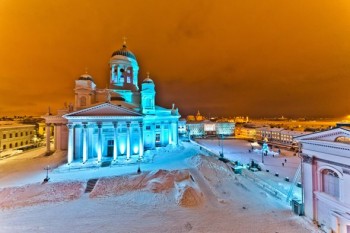
Helsinki Cathedral, lit by Martin Kuhn. Photo: Ralph Larmann
Helsinki is about to celebrate its third Season of Light. A team of designers and artists have created a series of works that will transform the urban milieu and buildings into ‘an experience for the senses and emotions’ in early January (31st December to 9 January).
For example, Helsinki Cathedral will be illuminated by light artist Mikki Kunttu, accompanied by a special sound environment. The light installation will run every day from 5 pm to 11 pm.
The German lighting designer Martin Kuhn will create an installation around Unioninkatu street, using LED technology. It will run from 6 pm to 10 pm.
Take a look at the programme – there are also photo and video samples from the previous Seasons of Light – here.
Who knows whether Helsinki will see any snow at New Year either (Christmas was black this time); nevertheless, these colours will brighten up the darkest hours in the city.
And hey, the winter solstice is already behind us, there is going to be more and more light each day!
Keeping up with the Joneskis
17 April 2009 | Extracts, Non-fiction
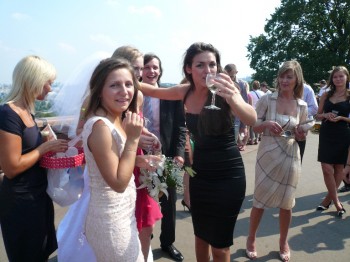
Toasting the bride: cheerful wedding parties drive up to the Sparrow Hills in Moscow in summer
Moscow-based journalist Anna-Lena Laurén finds the new Russia a promised land of materialism – a place where appearances are everything, and how you pay for maintaining them is a matter of strictly secondary interest
‘I want to go to the nightclub by boat! Come on, let’s hire one,’ Ilya says, heading towards the shore where a boat for at least twenty people is moored. There are six of us.
After two minutes of negotiation, he takes up his position alongside the gangway. He welcomes us onboard with a chivalrous gesture. We step onto the boat and are gently taken off down the Moyka canal in the white night of St Petersburg in June. The sky is pale pink and dark blue-lilac, the air damp and cold, but the captain hands out rugs to keep us warm. The ornamented bridges and pastel-coloured façades of St Petersburg glide past in a faint glow, it’s just light enough to make out the colours, powdery pink, vanilla yellow, pale blue. More…
The almost nearly perfect travel book
4 April 2014 | Articles, Non-fiction
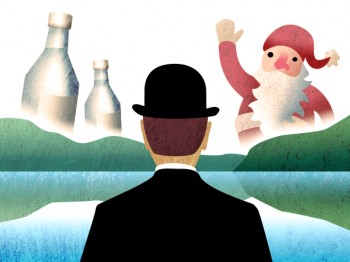
Illustration: Joonas Väänänen
The question of what foreign people think of us Finns, and Finland has always been a particularly burning one in these latitudes: a young nation, a small people. Can we be as good as bigger and wealthier nations? Tommi Uschanov reads a new book on the Nordic countries published in England, keeping a sharp eye on what is being said about…. Finland, naturally
When an article based on The Almost Nearly Perfect People: The Truth About the Nordic Miracle by Michael Booth was published last January in the London Guardian, there was a nationwide outcry in Finland. ‘Finland being bashed in the British media,’ one tabloid headlined grandiosely, while a sober financial paper spoke of ‘a broadside full of stinky stuff’. It takes a re-reading of the article after having read the book to understand why. To create an artificial atmosphere of controversy, the article is lop-sidedly critical of Finland in a way which the book goes out of its way to avoid.
The Almost Nearly Perfect People belongs in a by now time-honoured genre within English letters: the humorous encomium to a host culture by an expatriate – or immigrant, as we hosts impolitely insist on calling them. The only difference is that Michael Booth, a British food and travel writer, does not discuss only Denmark, where he has lived for a decade, but visits each of the other four Nordic countries in turn. More…
Can’t say it’s not spring
18 April 2013 | Fiction, Prose
Short prose from Mahdottomuuksien rajoissa. Matkakirja (‘In the realm of impossibility. A travel book’, Teos, 2013). Texts by Katri Tapola, illustrations by Virpi Talvitie. Interview by Anna-Leena Ekroos
The first try
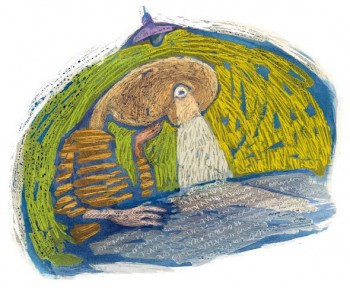
A reader doesn’t have to understand anything on the first try. You can always put a book aside and see if the second read will help. If the second, third, fourth, or even fifth read doesn’t help, that’s still all right. What is this constant compulsion to understand everything? There’s nothing wrong with not understanding – on the contrary, it is precisely the state of baffled befuddlement that hides the hope of light within it. I can’t understand any of this! I’m having fun! the reader happily exclaims, and goes on with his life, eyes overflowing with light. More…

